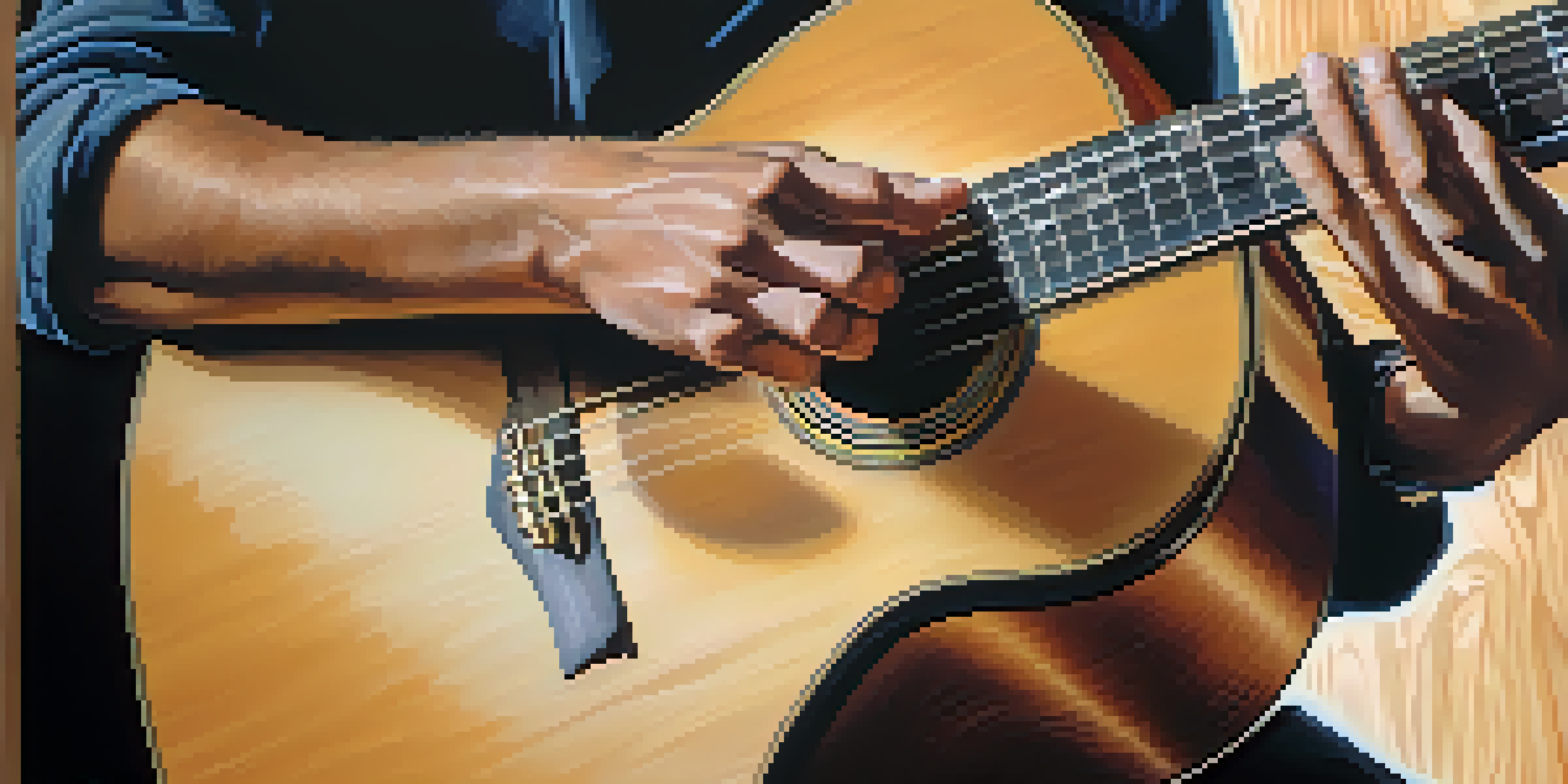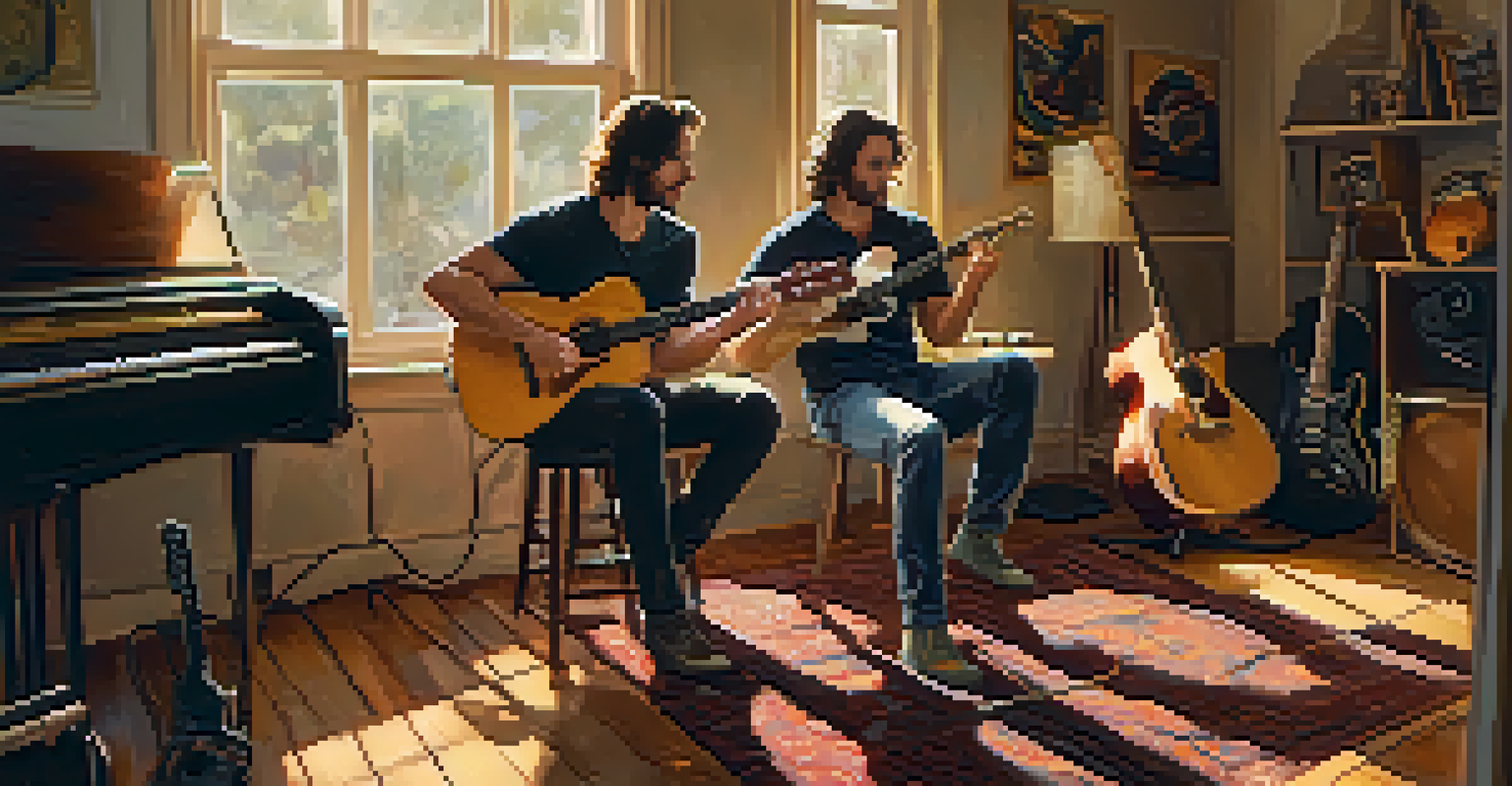Developing Unique Guitar Styles to Enrich Your Songwriting Voice

Understanding Your Current Guitar Style
Before diving into new styles, it’s crucial to understand your existing guitar technique. Take some time to assess the chords, scales, and fingerpicking patterns you frequently use. This self-awareness will serve as a solid foundation for further exploration and growth.
Guitar is the best instrument to play alone and the best instrument to play with others.
Think of your current style as a starting point on a map. Knowing where you are geographically can help you decide where to go next—whether it's branching out into fingerstyle, blues, or even jazz. The beauty of guitar is that every style has its own unique flavor, waiting for you to explore.
By identifying your current strengths and weaknesses, you can set aside the time to work on areas that may need improvement. This will not only enhance your playing ability but also enable you to blend different styles seamlessly into your songwriting.
Exploring Different Genres for Inspiration
One of the best ways to develop a unique guitar style is by exploring various genres. From rock and blues to folk and jazz, each genre offers a distinct approach to guitar playing that can inspire your songwriting. For instance, the intricate fingerpicking in folk can add a new dimension to your sound.

Listening to artists outside of your usual playlists can spark creative ideas. Try to analyze their techniques, chord progressions, and how they construct their songs. You might find that a simple lick from a jazz piece can transform a mundane chord progression into something vibrant.
Understand Your Current Style
Self-awareness of your existing guitar techniques lays the groundwork for exploring new styles.
Don't be afraid to integrate elements from different genres into your own style. This fusion not only enriches your playing but also helps you develop a sound that is uniquely yours, setting your music apart from others.
Creating Unique Chord Progressions
Chord progressions are the backbone of any song, and crafting unique ones can significantly enhance your songwriting. Instead of sticking to standard progressions, experiment with unexpected chord changes to create tension and release. For example, try incorporating a minor chord where a major chord is expected.
The beauty of music is that it connects people, and the guitar is a powerful tool for that connection.
You can also explore alternate tunings to give your guitar a fresh voice. Tunings like drop D or open G can open up new possibilities for progressions and riffs. This small change can lead to completely different songwriting ideas and inspire creativity.
Additionally, layering different chord voicings can create a richer sound. By varying the way you play chords—like using barre chords, arpeggios, or even incorporating slides—you can add depth and complexity, resulting in a more engaging song.
Incorporating Fingerstyle Techniques
Fingerstyle guitar offers a beautiful way to enrich your sound and develop a unique style. Unlike strumming, fingerstyle allows for intricate melodies and harmonies to shine through, making your songs more dynamic. If you haven't tried it yet, consider starting with simple fingerpicking patterns to get the hang of it.
Imagine your guitar as a piano; each finger can play a different note, creating a fuller sound. This technique encourages you to think outside the box and can lead to unexpected melodic ideas. For instance, you can alternate bass notes while playing a melody on top, which adds texture.
Explore Genres for Inspiration
Diving into various music genres can spark creativity and help you develop a unique sound.
As you become comfortable with fingerstyle, don't hesitate to incorporate it into your songwriting. It can turn a simple chord progression into something captivating and unique, allowing your music to resonate deeper with listeners.
Experimenting with Alternate Tunings
Alternate tunings can completely transform the way your guitar sounds and feels. By changing the standard EADGBE tuning, you can unlock new chord voicings and melodic possibilities that you might not have considered before. For example, tuning to DADGAD can provide a lush, open sound perfect for folk music.
Trying out different tunings encourages you to think creatively and can even lead to spontaneous songwriting. As you experiment, you might stumble upon unique riffs or chord progressions that inspire entire songs. It’s like discovering a hidden treasure in your own instrument.
Moreover, alternate tunings can refresh your practice routine. Instead of mindlessly going through the same exercises, you can explore new sounds and ideas, keeping your passion for guitar alive and vibrant.
Using Improvisation to Enhance Creativity
Improvisation is a powerful tool for developing your unique guitar style. By allowing yourself to play freely, you can discover new melodies, rhythms, and ideas that may not come to you while writing songs in a structured way. Set aside time during your practice to just play and see where your creativity takes you.
Think of improvisation as a conversation between you and your guitar. Sometimes, the most beautiful ideas emerge when you're not trying too hard. This spontaneity can lead to unexpected breakthroughs and become a source of inspiration for your songwriting.
Experiment with New Techniques
Incorporating fingerstyle, alternate tunings, and improvisation can enhance your creativity and songwriting.
Incorporating improvisational sessions into your routine can help you develop a more organic connection with your instrument, enriching both your playing and songwriting voice. The more you improvise, the more you'll learn about your preferences and style, making it easier to express yourself in your music.
Collaborating with Other Musicians
Collaborating with other musicians can provide fresh perspectives and techniques that enrich your guitar style. Whether it's jamming with friends or joining a local music group, sharing ideas and skills can lead to exciting developments in your songwriting process. Each musician brings their own unique flair, which can inspire you to experiment more.
When you play with others, you might find yourself stepping outside your comfort zone. Maybe you'll be introduced to new genres or techniques that you hadn’t considered before. This collaborative spirit can ignite your creativity, leading to innovative ideas that shape your unique sound.

Moreover, collaboration encourages you to listen actively and adapt your style to fit different musical contexts. This adaptability is essential for personal growth as a musician and songwriter, ultimately enriching your overall craft.